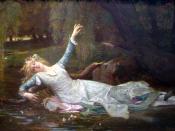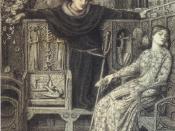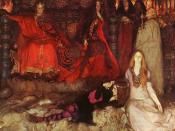"Hamlet sees Gertrude give way to Claudius, [and] Ophelia gives way to Poloniusâ¦" (David Leverenz) Examine how Shakespeare treats the female characters/ explores the role of woman in Hamlet and what the response of modern audience might be to this aspect of the play.
In Shakespeare's play, Hamlet, there are two central female characters; those of Gertrude, Hamlet's mother and the Queen of Denmark, and Ophelia the subject of much of Hamlet's attention. Shakespeare portrays these two women to weak minded, mentally and physically, and nothing more than something for men. This was representative of the social position in the Elizabethan age, and hence was reflected in Elizabethan theatre. It was as such quite ironic that England saw a Female monarch on the throne at that time, Queen Elizabeth I. However, as time has progressed so has women's position and role in society; they no longer live in such a male dominated world, rather one based on equality between both sexes, and hence I believe that many women of a 'modern audience' might be shocked at female's positions in the 16th Centuary.
Ophelia in the plays an important role in Hamlet for a number of reasons. Women of the age were expected to be chaste, silent and obedient, and these expectations are clearly shown in Ophelia's character. Early on in the play, we see Laertes advising Ophelia not to give in to Hamlet's advances. Laertes describes Ophelia's virginity as a 'Chaste Treasure' and he describes desire as dangerous. Ophelia has almost a moral duty as a woman not to give in to Hamlet's advances. The position of women on the play is further outlined in Act One, Scene Three with Ophelia's conversation with Polonius. Ophelia says "I do not know my lord, what I should think". In this situation and in many others in the play Ophelia refers to men as 'my lord' inferring inferiority between the sexes. Equally here, we see perhaps a view that women either are being portrayed to be stupid, or are alternatively not meant to think. There is here also a the issue of "ownership". Polonius sees Ophelia as his property, and later in the play remarks "I have a daughter - have whilst she is mine' - she is his property until she is married away. This idea that women belong to their father or their husband was part of Elizabethan culture, and only in recent years has this changed. Aspects of the play such as this might shock a modern audience.
Hamlet's view on Ophelia changes as the play proceeds.
Gertude equally plays a critical part in Hamlet.
Hamlets view on women womens role then and now The role of women in Hamlet is one of almost a second class to men. They are portrayed as vulnerable to sexual advances,





